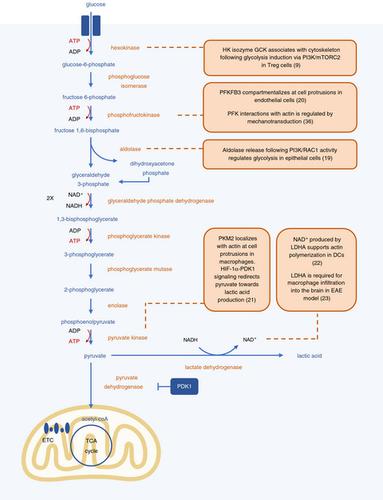当前位置:
X-MOL 学术
›
Immunology
›
论文详情
Our official English website, www.x-mol.net, welcomes your feedback! (Note: you will need to create a separate account there.)
Implications of cellular metabolism for immune cell migration.
Immunology ( IF 6.4 ) Pub Date : 2020-09-13 , DOI: 10.1111/imm.13260 Hannah Guak 1, 2 , Connie M Krawczyk 2
Immunology ( IF 6.4 ) Pub Date : 2020-09-13 , DOI: 10.1111/imm.13260 Hannah Guak 1, 2 , Connie M Krawczyk 2
Affiliation

|
Cell migration is an essential, energetically demanding process in immunity. Immune cells navigate the body via chemokines and other immune mediators, which are altered under inflammatory conditions of injury or infection. Several factors determine the migratory abilities of different types of immune cells in diverse contexts, including the precise co‐ordination of cytoskeletal remodelling, the expression of specific chemokine receptors and integrins, and environmental conditions. In this review, we present an overview of recent advances in our understanding of the relationship of each of these factors with cellular metabolism, with a focus on the spatial organization of glycolysis and mitochondria, reciprocal regulation of chemokine receptors and the influence of environmental changes.
中文翻译:

细胞代谢对免疫细胞迁移的影响。
细胞迁移是免疫中必不可少的、能量要求很高的过程。免疫细胞通过趋化因子和其他免疫介质在体内导航,这些介质在损伤或感染的炎症条件下会发生改变。多种因素决定了不同类型免疫细胞在不同环境中的迁移能力,包括细胞骨架重塑的精确协调、特定趋化因子受体和整合素的表达以及环境条件。在这篇综述中,我们概述了我们对这些因素中每一个与细胞代谢的关系的理解的最新进展,重点是糖酵解和线粒体的空间组织、趋化因子受体的相互调节和环境变化的影响。
更新日期:2020-10-22
中文翻译:

细胞代谢对免疫细胞迁移的影响。
细胞迁移是免疫中必不可少的、能量要求很高的过程。免疫细胞通过趋化因子和其他免疫介质在体内导航,这些介质在损伤或感染的炎症条件下会发生改变。多种因素决定了不同类型免疫细胞在不同环境中的迁移能力,包括细胞骨架重塑的精确协调、特定趋化因子受体和整合素的表达以及环境条件。在这篇综述中,我们概述了我们对这些因素中每一个与细胞代谢的关系的理解的最新进展,重点是糖酵解和线粒体的空间组织、趋化因子受体的相互调节和环境变化的影响。



























 京公网安备 11010802027423号
京公网安备 11010802027423号